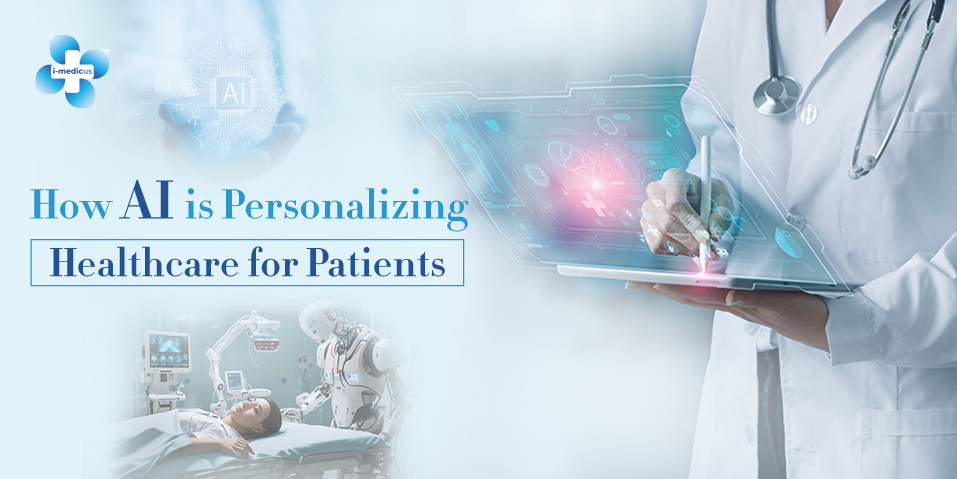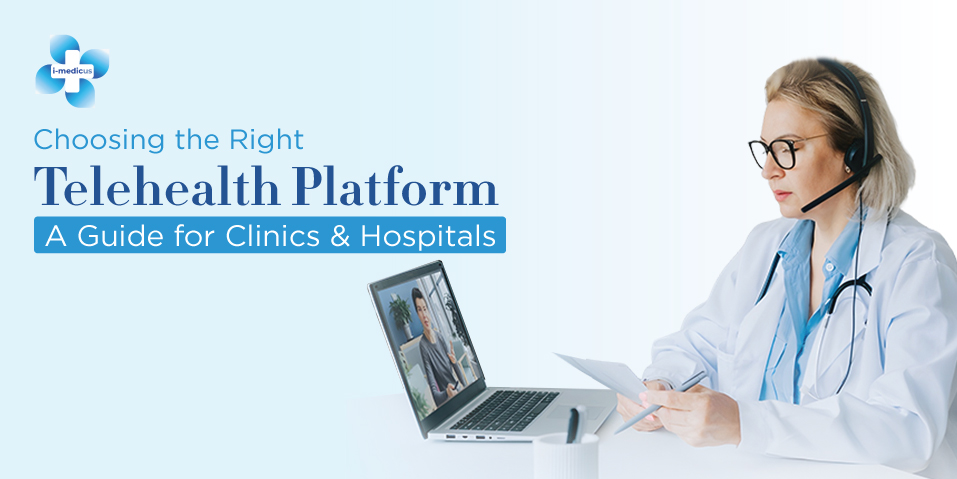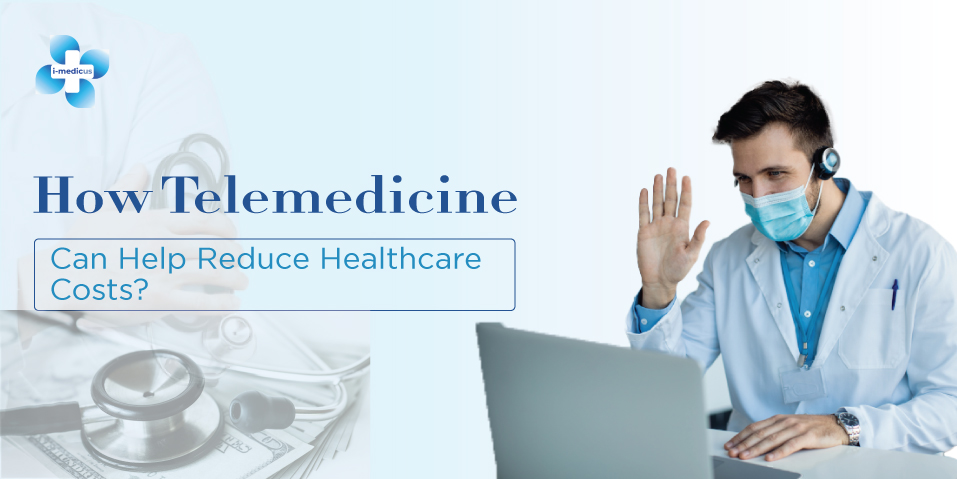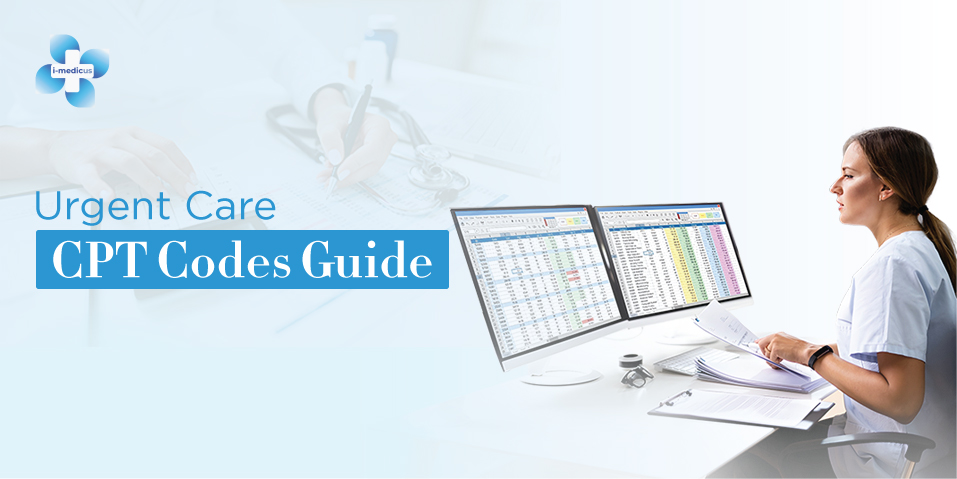AI is already benefiting many industries. Nowadays, the healthcare industry enhances medical care with smart AI interactions and features. It assists doctors and nurses in giving patients quality services and applies data and smart machines to identify the individual’s requirements and desires. In popular apps like i-medicus, AI can assist users even without doctors. As a result, AI can help patients without doctors or in an emergency. This is what users refer to as personalized health care at their convenience. So, in this blog, we will cover every aspect of AI in healthcare and how it embraces patients’ medical care.
Understanding Personalized Healthcare
Personalized health care means that every individual has to be treated differently since everyone is different in some way or another. It is understood that health is a very individual thing, and every person has their specific needs. Conventional health care is designed to apply standard treatment to all its patients. However, personalized Telehealth Services for Patients have multiple advantages. For instance, it allows the doctor to develop treatment options according to the individual’s requirements. One might expect the experience to be a little negative, but this approach might help achieve better results and satisfy patients.
AI in Diagnosis and Treatment
The most significant aspect through which they are applying artificial intelligence to personalize healthcare is diagnosis and treatment. A capability can be highlighted within AI based on the ability to process a large amount of data in a short amount of time. It can dig into a patient’s medical history and current condition and can even address genetic predispositions. It assists doctors to discern diseases at an earlier and more easily treatable stage.
For instance, cancer has been one of the fields that has benefited from the application of AI in diagnosis. It can read X-rays and identify elements that a human would never be able to say exist or do not exist there. It means that by using Telehealth App professionals can diagnose cancer at an early stage, and therefore, treatment can be initiated, which increases the efficiency of the treatment as well. It can also recommend the most suitable treatment considering the patient’s conditions. It means each patient is treated according to the best practice for their ailment or disease.
AI and Patient Monitoring
Another interesting and largely beneficial area where AI is being applied is patient surveillance. Many patients require constant supervision to deal with long-term disorders such as diabetes or heart disease. AI can also help by ensuring patients are always under check and giving updates directly to the doctors.
Smartwatches, for example, can monitor a patient’s heart rate, blood pressure, and other body vitals. By using AI, medical history and other data can be processed, and if there is a problem, the doctor will be informed. This means that patients can be easily attended to and can equally access the health facility even if they are not in the hospital. It also assists patients in controlling their illnesses better and thus enjoying a healthier life.
AI in Predictive Analytics
Another rapidly developing area is where AI is revolutionizing healthcare for patients with predictive analytics. AI can anticipate a patient’s future sicknesses with the help of his/her records. It implies that doctors can act when an issue is likely to be major.
For instance, it can tell if a patient that you are treating is predisposed to a particular illness. It can look at their lifestyle, medical history, as well as the family history to and from whom they may contract herpes. It assists doctors in delivering health recommendations that people need to follow to stay out of the hospital. These are changes that a patient can embrace to overcome these conditions and not be a burden to society or other people. Even hospital staffing requirements can be predicted with the help of predictive analytics, which is effective in managing resources.
AI in Personalized Medicine
AI is making personalized medicine possible and is rapidly growing in popularity because of this. It entails developing specific therapies for a person to cater to his or her needs. Machine learning, big data, and data analysis can provide a great deal of information about a patient’s genetic makeup and can choose the therapies that could be effective in the case.
For instance, in cancer treatment, it can be used to determine a chemotherapy regime specific to a given patient. No one method will work for every patient’s cancer, and treatment plans are often very individualized. AI can study the genes of cancer’s antecedents and come up with a therapy that will focus precisely on the tumor. Usually, this improves the patient’s condition and results in fewer negative side effects.
AI and Mental Health
It is also being applied to mental health. Such conditions are challenging to identify and manage unless one goes through a professional diagnosis. Through social media analysis or with data received from mobile applications or any other source, AI can identify symptoms of mental health disorders. That can assist in the identification of such patterns, which may provide a hint of depression, anxiety, or any other disorder.
Chatbots and virtual therapists are also being developed through AI technology. They are implemented for children who may need help getting therapy since they can be implemented at home. It also assists in providing advice, monitoring mood changes, and even recommending how to handle the situation or emotion. It means those in need will effectively access the help needed when they need it.
AI and Healthcare Accessibility
It has been seen that AI is extending healthcare reach to the unreached population in terms of geographical locations and availability of Telehealth Services in various facilities. One example of this is telemedicine, which the government also suggested as a communication style during the pandemic outbreak.
Telemedicine is a technique of delivering medical facilities and services through technology without direct interaction between the patient and the doctor. How does artificial intelligence support telemedicine? AI can help the doctor diagnose through tools and constantly monitor the patient’s condition through the use of technology.
For instance, through image data or patient data sent directly from home, AI aids doctors in examining patients. It implies that anyone in rural areas can access health facilities that are granted the same standards as those in urban centers. In addition, it may interpret languages in real time to curb language barriers between doctors and patients who speak different languages.
Challenges and Ethical Considerations
Although AI has enormous potential in the healthcare field, it also presents some issues and risks. The major concern is privacy. AI in Telehealth app requires a large amount of data for its efficiency. Such information can contain highly sensitive data about patients treated in healthcare facilities. Proper measures have to be taken to safeguard this kind of data and its use.
Another problem with AI is the issue of differences in the standard of correctness and credibility of these systems. Of course, it is also important to understand that AI can also be wrong in some cases, as can people. One of the most important aspects is when the doctor reveals the need for AI checks and balances to have accurate systems. AI should not be a doctor’s main decision-maker but rather assist them in coming up with a final decision.
AI in Health and Medical Education
The use of AI in medicine has great Benefits for Patients. Over time, information technology is bound to get even more advanced, and this will determine the capability of developing artificial intelligence systems. We can further anticipate that patients’ treatments will become even more specific and efficient.
AI will also make new advancements in various patient health statuses, clinical management, and risk prediction. This means doctors will be able to detect the presence of a disease earlier in a patient, enhancing early treatment and prevention. AI will also make a significant contribution to increasing people’s access to healthcare worldwide.
However, these are the issues and undesirable consequences that have to be faced and addressed while embracing AI in the healthcare industry. This means that it will be important for these components—privacy, accuracy, and fairness—to be integrated as we proceed further. AI, if applied properly, has the potential to dramatically improve healthcare and positively impact millions of people’s lives.
Looking for Telehealth app to extend your reach?
i-medicus your ultimate Telehealth partner
Conclusion
There is no doubt that AI is the ultimate tool for this generation to improve their facilities and user experience. By simply integrating AI into the healthcare app, you can assist the patients and doctors at the same time and reduce the effective time spent on billing and other programming. It is also useful in helping physicians diagnose diseases better and treat them correctly. AI also benefits patient tracking, diagnostics, prescriptions, mental health services, and care accessibility. Yes, there are various issues and concerns to overcome and ethical questions to answer, mainly concerning patient data and care. Still, the future of AI in healthcare is promising. Thus, it is possible to introduce an effective and modern healthcare system based on the use of AI to improve people’s lives.
FAQs
1. How does AI improve the accuracy of medical diagnoses?
AI analyses large amounts of data, including medical records and images, to identify disease patterns that humans might miss. For example, AI can detect early signs of cancer in images, leading to earlier and more effective treatments.
2. Can AI help in managing chronic diseases?
Yes, AI helps manage chronic diseases by using wearable devices to track vital signs like heart rate and blood pressure. AI analyses this data in real time and alerts doctors to any issues, allowing for timely interventions and better disease management.
3. How does AI contribute to personalized medicine?
AI creates personalized treatment plans by analyzing individual genetic and health data. For example, in cancer treatment, AI can design tailored chemotherapy regimens based on the genetic makeup of a patient’s tumor, resulting in more effective and targeted treatments.
4. What are the ethical concerns associated with AI in healthcare?
Key ethical concerns include privacy, accuracy, and bias. AI needs access to sensitive patient data, which must be protected. Ensuring AI systems are accurate and unbiased is crucial in avoiding errors and unequal treatment.
5. How is AI making healthcare more accessible to people in remote areas?
AI enhances telemedicine and remote monitoring, enabling doctors to provide care to patients in rural or underserved areas. AI tools can offer real-time diagnostics and health monitoring, and language translation features break down communication barriers between doctors and patients.








